#Scientists were delighted to discover that parrots willingly made video calls to bird friends and were less lonely as a result
Explore tagged Tumblr posts
Text
Yahoo News: Scientists were delighted to discover that parrots willingly made video calls to bird friends and were less lonely as a result
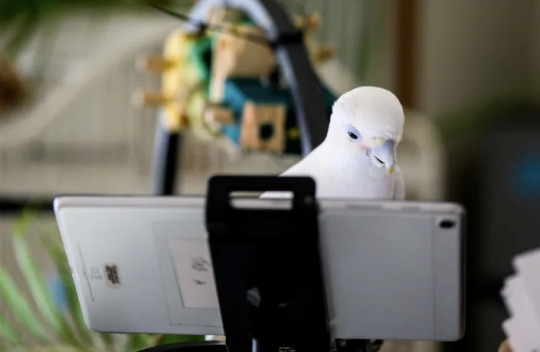
Researchers trained parrots to call certain birds. Later the parrots chose who they wanted to call.
The researchers were delighted when the parrots interacted with each other over the screen.
Scientists had to extensively train bird parents for this exercise. Not just anyone should try it.
Researchers have discovered that parrots are pretty much just like us when it comes to video chatting with friends.
The authors of a new study found that virtual quality time with bird friends seemed to reduce signs of loneliness in parrots and improve their lives overall.
The researchers also told Insider that they were delighted when the parrots on either end of the call interacted with each other by tapping the screen and doing activities together like preening — which means the birds were bonding.
The study's results are important for the many pet parrots who live alone with their humans and thus may not get their high social needs met.
That's because a lack of socialization for birds in the parrot family — which includes cockatoos, cockatiels, macaws, African Greys, lovebirds, budgies, and more — can lead to harmful behaviors like picking or destroying their feathers, pacing and rocking, aggression, or excessive sleeping.
Why parrots need so much socialization
"I think birds in captivity have been misunderstood and mischaracterized for years," said Jennifer Cunha, parrot behavior expert, researcher at Northeastern University, and one of the study's authors.
Cunha added that while people often consider them ornamental, parrots are also incredibly social and intelligent animals.
For example, in the wild, parrots generally live in complex social environments, said Rébecca Kleinberger, assistant professor at Northeastern University in computer sciences and music, and another author of the study.
They tend to pair off within a larger flock of parrots and do most things, like feeding, preening, sleeping, traveling, and raising their young within this social group, Kleinberger and Cunha said.
So, when these birds live alone as pets with minimal social interaction, they have little outlet for many of their cognitive abilities.
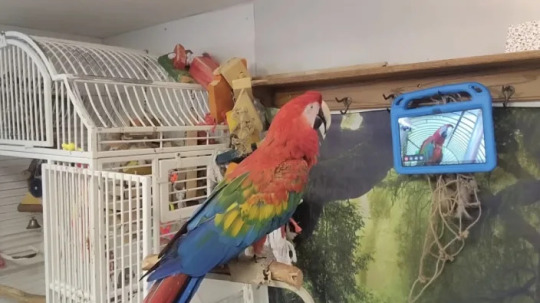
Under-stimulated parrots may quickly become bored, frustrated, and lonely. In fact, Cunha said, some countries have made it illegal to keep only one parrot, due to their complex social needs.
The ability to make video calls to other parrots, then, may give birds the chance to access the socialization and species identity they have in the wild, Cunha said.
How the study worked
First, researchers recruited 18 parrots and their caregivers via Parrot Kindergarten — a coaching program for parrots and their caretakers that Cunha operates.
They then had a training phase where parrots learned to select another bird's photo on a tablet to start a call on Facebook Messenger — which the parrots did successfully in just a couple of weeks.
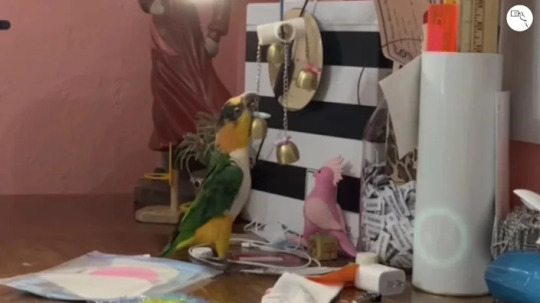
After that, parrots would ring a bell when they wanted to make a call. When their caregiver offered the tablet, they'd touch the picture of the bird they wanted to chat with.
Initially, the birds were given treats for ringing the bell and selecting a bird "friend," but after the training period, they stopped getting treats. The researchers were happily surprised by how quickly the birds picked up the method for calling one another voluntarily.
Researchers were also delighted to see the parrots engaging with the video calls by following the birds on the other side of the screen, both visually and by directly touching the tablet.
Many birds mirrored behaviors they saw their friends do, like foraging, preening, and flying.
"Throughout the study we observed a diversity of social behaviors, from preening together and sleeping together on-screen to vocalizing," Kleinberger said.
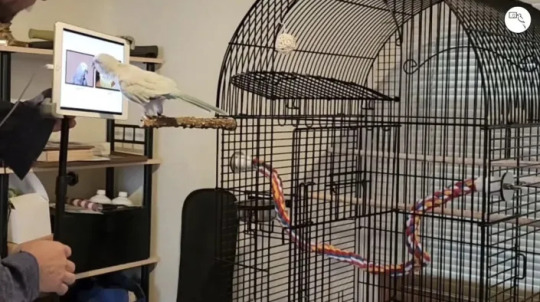
What's more, the more calls a parrot received, the more they wanted to call others, said Ilyena Hirskyj-Douglas, computer science lecturer at the University of Glasgow and study co-author.
"They developed favorite parrots to call, and most parrots would engage with the system for the maximum amount of time," Hirskyj-Douglas said.
Parrots could make two calls a day, with each call lasting no more than five minutes. The researchers set this time limit for safety and ethical reasons and to minimize the time commitment for caregivers.
Kleinberger added that the sheer number of calls made by the parrots — 147 in all — seemed to support their interest and engagement with the bird on the other side of the screen.
Video chats had a lot of benefits for parrots
All of the parrot caretakers involved said their bird had a positive experience with video calling, the study said.
Some caretakers said their birds reacted to their video friends the same way they'd react to real people or birds. One caretaker said their bird even called "Come back!" when the other bird walked off-screen.
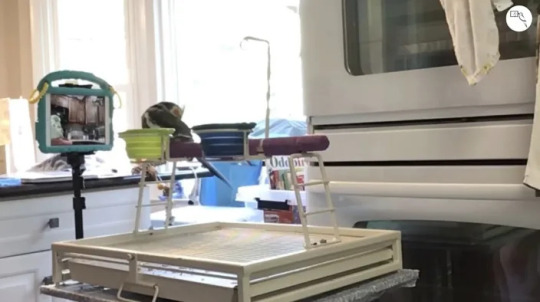
All but one of the caretakers said they believed their parrot got more out of the video chat than simple enjoyment. For instance, one parrot seemed to gain confidence and began flying more. Others seemed calmer in general, the study said.
Video calling won't work for every parrot
The researchers extensively trained the parrot caretakers who participated in the study, Cunha said.
Video calling itself has to be conducted in a sensitive, ethical manner, to slowly introduce the technology and make sure there are no fear reactions, Hirskyj-Douglas added.
Parrot caregivers learned, for instance, to recognize signs of stress during the video calls and offer encouragement to help reduce any fear associated with the new experience.
Caregivers would also end the call if their bird seemed uncomfortable or walked away from the calling zone, Hirskyj-Douglas said. That way, the parrots learned they could simply walk away if they didn't want to interact.
Forced socialization isn't in any parrot's best interest. The researchers released three parrots from the study in its early stages, as these birds didn't seem to like the calls at all.
But most of the parrots apparently enjoyed the experience and chose to make plenty of calls to other birds.
The study authors acknowledge the need for additional research, as this study is the first exploring video calling for parrots. That said, they believe video calling could become an important way to help isolated parrots build and maintain important connections with other members of their species — just as it does for people.
Read the original article on Business Insider
#parrots#Scientists were delighted to discover that parrots willingly made video calls to bird friends and were less lonely as a result
3 notes
·
View notes
Text
Scientists were delighted to discover that parrots willingly made video calls to bird friends and were less lonely as a result
0 notes
